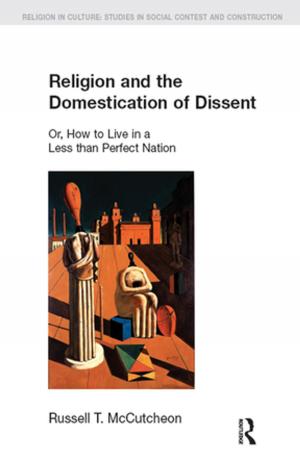Pedagogy, Image Practices, and Contested Corporealities
Nonfiction, Reference & Language, Education & Teaching| Author: | ISBN: | 9781317636847 | |
| Publisher: | Taylor and Francis | Publication: | February 5, 2016 |
| Imprint: | Routledge | Language: | English |
| Author: | |
| ISBN: | 9781317636847 |
| Publisher: | Taylor and Francis |
| Publication: | February 5, 2016 |
| Imprint: | Routledge |
| Language: | English |
This volume focuses on popular film, television, and online representations of contested corporealities and contributes to visual culture studies, disability studies, critical pedagogy, and medical humanities. Emphasizing unruly embodiments that transgress and transform, the volume conceptualizes visual culture as a space of query and accountability. In their introduction, the editors underline how spaces of cultural production provide necessary contexts for analyzing the social impact of contested corporealities. Contributors, in turn, offer new perspectives on technologies, disability, and cultural production. Eunjung Kim argues that life-size dolls in contemporary art films show how acts of caring for radically passive bodies can emerge as both erotic and beautiful; Nicole Markotić critiques the prioritizing of death as the most desirable, logical outcome in biopics of disability; and Katherine W. Sweaney's article on the online anatomization of an amnesiac's brain reminds us of the high stakes for medicine and science in the public display of knowledge-making. Working at the intersection of fat and critical race studies, Scott Stoneman discusses the body politics of the film Precious. Katerie Gladdys and Deshae E. Lott reflect on their lyrical installation about life with mechanical ventilation, and Ann Fudge Schormans and Adrienne Chambon examine how image-making by persons with intellectual disabilities can intervene in ableist-defined social space. With attention to queer theory and transnationalism, Michael Gill considers the British web-based RTV program, The Specials, where young men labeled as intellectually disabled fashion their erotic self-understandings as they discuss and appreciate an ensemble of Thai kathoey performers. Concentrating on the global politics of organ transplantation, Donna McCormack critically examines feature films that mediate questions of community, ethics, and mobility. The volume is further enriched by the inclusion of an interview in which Danielle Peers, Melisa Brittain, and Robert McRuer discuss the significance of crip possibilities in art and academia.
This book was originally published as a special issue of The Review of Education, Pedagogy, and Cultural Studies.
This volume focuses on popular film, television, and online representations of contested corporealities and contributes to visual culture studies, disability studies, critical pedagogy, and medical humanities. Emphasizing unruly embodiments that transgress and transform, the volume conceptualizes visual culture as a space of query and accountability. In their introduction, the editors underline how spaces of cultural production provide necessary contexts for analyzing the social impact of contested corporealities. Contributors, in turn, offer new perspectives on technologies, disability, and cultural production. Eunjung Kim argues that life-size dolls in contemporary art films show how acts of caring for radically passive bodies can emerge as both erotic and beautiful; Nicole Markotić critiques the prioritizing of death as the most desirable, logical outcome in biopics of disability; and Katherine W. Sweaney's article on the online anatomization of an amnesiac's brain reminds us of the high stakes for medicine and science in the public display of knowledge-making. Working at the intersection of fat and critical race studies, Scott Stoneman discusses the body politics of the film Precious. Katerie Gladdys and Deshae E. Lott reflect on their lyrical installation about life with mechanical ventilation, and Ann Fudge Schormans and Adrienne Chambon examine how image-making by persons with intellectual disabilities can intervene in ableist-defined social space. With attention to queer theory and transnationalism, Michael Gill considers the British web-based RTV program, The Specials, where young men labeled as intellectually disabled fashion their erotic self-understandings as they discuss and appreciate an ensemble of Thai kathoey performers. Concentrating on the global politics of organ transplantation, Donna McCormack critically examines feature films that mediate questions of community, ethics, and mobility. The volume is further enriched by the inclusion of an interview in which Danielle Peers, Melisa Brittain, and Robert McRuer discuss the significance of crip possibilities in art and academia.
This book was originally published as a special issue of The Review of Education, Pedagogy, and Cultural Studies.















